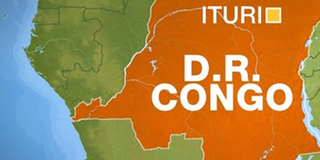Politics and oil: the unseen drivers of violence in Congo’s Ituri Province

What you need to know:
The roots of the violence are framed in media reports as ethnic, but analysts and local observers say powerful political and commercial interests are what is really driving and exploiting the inter-communal tensions.
A recent wave of targeted attacks has left a trail of death, destruction, and mass displacement in the Democratic Republic of Congo’s northeastern province of Ituri.
The roots of the violence are framed in media reports as ethnic, but analysts and local observers say powerful political and commercial interests are what is really driving and exploiting the inter-communal tensions.
Between 1999 and 2004, some 50,000 people, mostly civilians, were killed in Ituri in fighting between different communities, sometimes backed by Uganda and Rwanda (see our In-Depth coverage). After more than a decade of relative peace, violence flared again in December and resumed in February on an even larger scale. More than 300,000 people have been displaced and thousands of homes torched in at least 70 villages, according to ACAPS, an independent humanitarian information service. While there is little direct evidence, experts, Ituri residents, and the powerful Catholic clergy have all suggested that unseen forces are driving the violence. Jason Stearns, of the Congo Research Group, noted that inter-communal tensions had been “relatively well managed” since 2007.
Marcel-Heritier Kapitene, a former opposition activist who lives in exile in Belgium, where he works as a researcher on Congolese politics and mineral extraction at GRIP, a peace and security institute, warned that if competition over natural resources is the key underlying factor, as he fears, then the situation is likely to deteriorate.
“It could spread to other areas with a heavy human toll,” Kapitene said. “If a tribal militia allied itself to such and such Congolese or foreign armed group to try to have a certain dominance of minerals, gold, and above all timber, there is reason to fear the consequences could be much more severe.”
He added that, in Ituri: “People are dying; not because they are of one ethnicity or another, but because they share the same land with minerals.”
According to Thierry Vircoulon, an analyst with the International Crisis Group, many of Congo’s recent flare-ups, Ituri’s included, are fuelled by politics, often at multiple levels.
“Their immediate causes are local conflicts that have never been completely extinguished and which have been fanned by a national dynamic,” he said, noting an intense power struggle for administrative control in Ituri.
Vircoulon said the locations, perpetrators, and targets of the current violence in Ituri were similar to those at the start of the 1999-2004 fighting. He noted a sense of “déjà vu” and suggested the roots of the previous conflict had never been properly addressed.
“It was neutralised by the joint action of international forces and the International Criminal Court, before which several militia leaders were tried,” he said, referring to Operation Artemis, a French military mission briefly deployed in Ituri in 2002 under an EU banner.
For Nicaise Kibel’Bel Oka, director of the Eastern Congo Centre for Geopolitical Study and Research, chief among those unresolved issues are long-running land disputes between the predominantly agricultural Lendu and the cattle-rearing Hema. Through Artemis and the ICC trials, “the international community thought it had restored stability to Ituri,” he said. “Sadly not.”
“The little peace that reigned for the last 10 years was only ephemeral. It’s what we call a graveyard peace, unsustainable. It wasn’t enough to stop the resumption of violence, given that members of the two communities never handed over weapons they can still use at any time, and that the land disputes between them are still in place.”
Lieutenant Jules Ngongo, the army’s spokesman in Ituri, said that youths from Lendu villages have been attacking and torching Hema villages and, more recently, targeting army positions. The violence has been concentrated in Ituri’s Djugu Territory, which lies to the north of the provincial capital, Bunia. The neighbouring territories of Mahagi and Irumu have also been affected.
The attackers have given no reasons for their actions, and no rebel leader from the dozens of armed groups operating in eastern Congo has expressed common cause with them.
“The security and intelligence services are trying to find out if this is an organised movement, who its leader is, or whether it is a movement of armed bandits,” Ngongo said.



